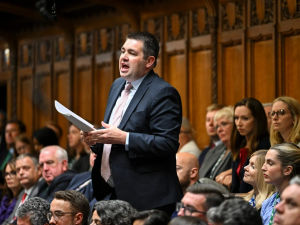What will Rishi's place in history be?
What were the thoughts running through Rishi Sunak's mind when he entered Downing Street a year ago today?
Awe at achieving the highest office in the land, at the indecently young age of 42? Pride at becoming the first British Asian to hold the office? Disbelief at the speed of his ascendancy, just seven years after being elected to parliament?
Probably all of those. But he would not be human if he did not also give a thought to his place in history. Being the youngest and first Asian PM is all very well, but it is hard to imagine that is what Mr Sunak will want to be remembered for. Any politician worth their salt will want to leave their mark, secure their place as a major figure, rather than a footnote, in the nation's history. Nobody wants to be the 'caretaker' PM.
Twelve months on, Mr Sunak knows very well he is fighting for his political future, and would probably admit in private that his first year has not gone the way he would want it to.
Mr Sunak would have been in no doubt that he was taking on what many would consider an impossible task.
Taking over a party that had been office for 12 years, that was 30 points behind in the polls, and had a maximum of two years to go before a general election, was always going to be a tall order. He also had to pick up the pieces from Liz Truss's 49-day government.
It is also difficult for any prime minister to take over mid-term, particularly when following a larger-than-life figure who has dominated the political scene for years. Jim Callaghan lived in the shadow of both Harold Wilson, his more extrovert predecessor, and Margaret Thatcher, waiting in the wings to usher in a new era. Similarly, Gordon Brown always came across as Blair-lite, the trusty lieutenant simply stepping in until a permanent replacement could be found. It is at this point that Sunak supporters will point to John Major, who defied the laws of gravity by winning an election just 18 months after Margaret Thatcher left Downing Street – although the less charitable among us might say he spent seven years as 'caretaker' PM.
Truth be told, Mr Sunak could scarcely have become Prime Minister at a worse time. Two years of lockdown was always going to leave a massive hangover, and the war in Ukraine was just starting to take its toll by the time he arrived in Downing Street. The Liz Truss debacle simply threw petrol onto the fire, and Mr Sunak also had to live with the stigma of being defeated by her in a leadership election just two months before.
The other problem is that Mr Sunak's strengths are also his weakness. While he may well have been the calm, sensible leader that Britain needed after the chaos of the Truss weeks, in ditching love-him-or-hate-him Boris Johnson, the Conservatives also threw away their crucial advantage over Labour: in Rishi Sunak, the Tories now have a leader who is every bit as bland as Sir Keir Starmer, but who is also weighed down by the baggage of his predecessors.
The past couple of years should teach anyone that betting on political outcomes is a mug's game, and there is still time for plenty of twists and turns yet. But a year into Rishi Sunak's time in office, he must surely know the odds are against him surviving the next election.
The one thing he owes to Liz Truss is that she guaranteed he would not suffer the indignity of being the shortest-serving prime minister of recent. That is one place in history he will be glad to avoid.





